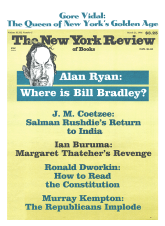In response to:
Twelve Angry Persons from the September 21, 1995 issue
To the Editors:
In his otherwise thoughtful discussion of the jury system [NYR, September 21, 1995], Andrew Hacker makes two significant mis-statements about my book, The Jury.
First, he wrongly asserts that I relied mainly on legal scholars for information about jury behavior instead of interviewing actual jurors. In fact, as is evident throughout the text, my book is based primarily on multiple, lengthy interviews with nearly every juror in the trials on which I focused. Indeed, I decided to write the book, even though dozens of fine academically oriented works on the jury system had preceded my research, precisely because I believed that jurors’ voices needed to be heard. As I wrote in the acknowledgments, “Jurors let me into their homes and workplaces, shared with me diaries and notes that were invaluable in helping me reconstruct deliberations, sat through multiple interviews, and in the Liggett case even included me in their weekend-long reunion a year after the verdict.” It’s largely through this reporting that I both described how the jury system works and reached my conclusions about how it can be improved.
Second, Mr. Hacker states incorrectly that I favor abolition of the jury system. On the contrary, I am an ardent supporter of the jury; the changes I propose are aimed at strengthening the system, not dismantling it. To give jurors the tools they need to do their job better, I suggest that judges give them legal instructions at the start of the trial, instead of just at the end; that these instructions be in plain English, not legalese; that jurors always be permitted to take notes and ask questions of witnesses; that reasonable time limits be placed on testimony; and that jurors be treated at all times with greater courtesy and respect. To increase fairness, I also recommend selecting jurors at random rather than letting lawyers and jury consultants remove qualified individuals from jury panels for purely strategic reasons.
As I said in the conclusion to The Jury, “jury service remains one of our most precious birthrights and, for most of us, our greatest source of direct political power. It’s a right we cannot afford to lose.”
Stephen J. Adler
New York City
Andrew Hacker replies:
If Stephen Adler does not want to abolish the jury system, his book moves toward that conclusion. All the cases he selected bolster his premise that juries across the country are “generally botching the job.” Nor can he find evidence that “juries do anything well enough to justify our continuing reliance on them.” Moreover, he admits that the jurors he interviewed served in the cases he criticizes. My review sought to show that in the vast majority of criminal trials—perhaps even the Simpson verdict?—juries reach just decisions. While I like some of Adler’s proposals, I am not so sure that they will give us better criminal verdicts. In this regard, I have received several letters from lawyers, who complain that jurors ignore legal protocols. My sense is that they would also like to be present during deliberations.
This Issue
March 21, 1996
Queen of the Golden Age
Too Nice to Win?
Palimpsest Regained



